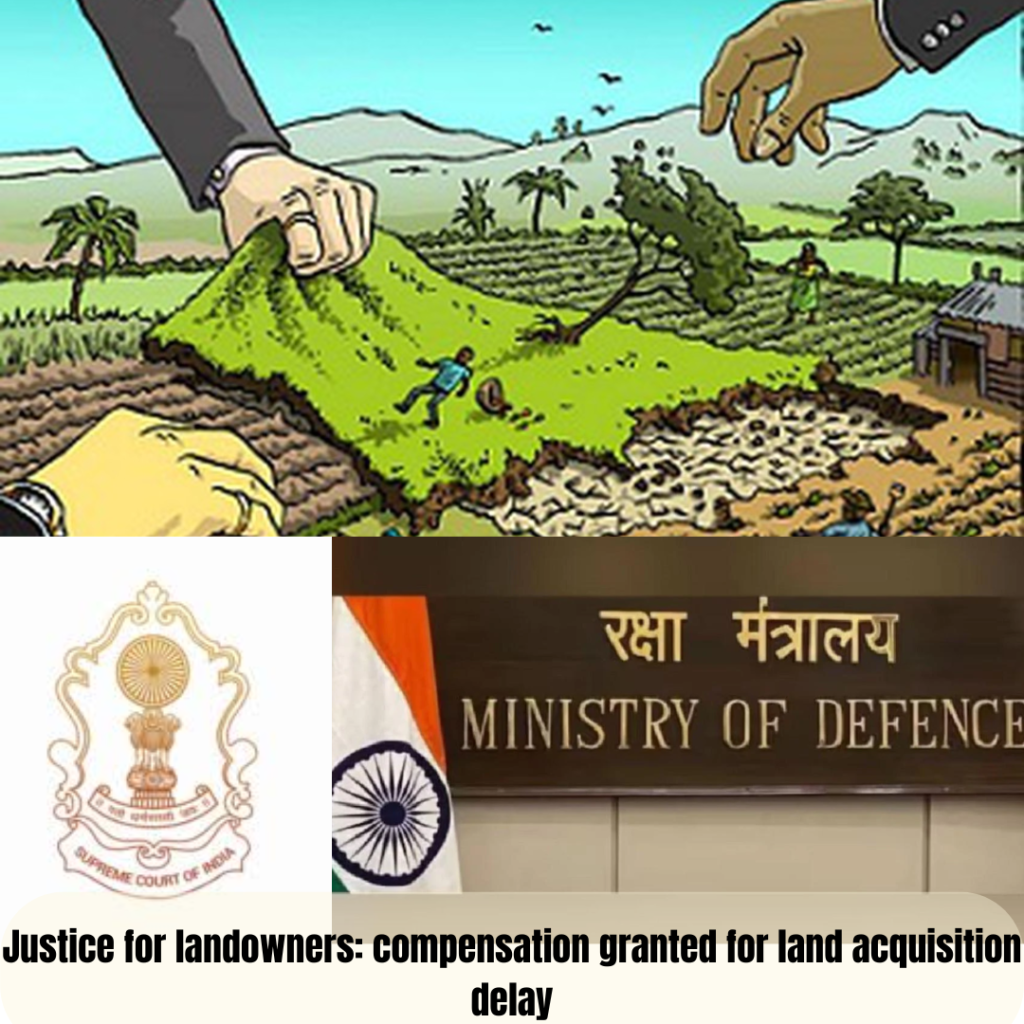Case Title: Union of India and anr. v. Dr. Asket Singh and ors
Case no: Civil.APL.NO. 1636-1637 of 2016
Dated on: 1 may 2024
Coram: Hon’ble JUSTICE ABHAY S. OKA and JUSTICE UJJAL BHUYAN
FACTS OF THE CASE
The Ministry of Defence initiated acquisition proceedings under the Requisitioning and Acquisition of Immovable Property Act, 1952. A notice of acquisition was issued on March 26, 1964, and the vesting of the acquired property was completed upon publication in the official gazette on April 3, 1964. Compensation for the acquired land was to be determined either by agreement between the acquiring body and the owners or by arbitration appointed by the Central Government under Section 8 of the 1952 Act. After a significant delay, an arbitrator was appointed, and on May 8, 1998, nearly after 22 years thereafter the arbitrator declared the market value of the acquired land at Rs.150/- per Marla. Both the first respondent (landowner) and the appellants (acquiring body) appealed against the arbitrator’s award. The High Court, in its judgment, adjusted the market value to Rs.350/- per Marla, considering the cases of Harbans Singh Shanni Devi v. Union of India and Dilawar Singh & Ors. v. Union of India & Ors., where market value was decided for similarly situated acquired lands granted solatium of 30% of market value and interest on the compensation due to the delay in arbitration proceedings.
ISSUES
- Whether the delay in the appointment of an arbitrator and subsequent determination of compensation constitutes grounds for awarding solatium and interest to the landowner.
- Whether the High Court’s decision to award solatium and interest to the landowner due to the delay in payment of compensation is justified under the circumstances of the case.
LEGAL PROVISIONS
Section 7 of Requisitioning and Acquisition of Immovable Property Act, 1952
Section 7 of the Requisitioning and Acquisition of Immovable Property Act, 1952, deals with the issuance of a notice of acquisition by the appropriate authority. This section lays down the procedure for notifying the owners of immovable property about the government’s intention to acquire their property for public purposes.
Section 8 of Requisitioning and Acquisition of Immovable Property Act, 1952
Section 8 of the Requisitioning and Acquisition of Immovable Property Act, 1952, deals with the determination of compensation for immovable property acquired or requisitioned by the government. It provides the process for fixing the compensation amount through the appointment of an arbitrator in cases where an agreement cannot be reached between the acquiring body and the property owners.
Article 14 of the Constitution of India
This article guarantees the right to equality before the law and prohibits discrimination. It ensures that state actions are not arbitrary and are based on reasonable classification.
Article 300A of the Constitution of India
This article deals with the right to property. It states that no person shall be deprived of his or her property except by authority of law.
CONTENTIONS OF THE APPELLANTS
The appellants argued that there is no provision for grant of solatium and interest under the 1952 Act. in previous cases where there was a delay by the Central Government in appointing an arbitrator for determining compensation, solatium and interest were granted. However, in this case, the delay primarily occurred in the disposal of arbitral proceedings, not in appointing an arbitrator. Therefore, they contended that the High Court should not have awarded both solatium and interest. The appellants pointed out that the first respondent (landowner) had already received the entire compensation amount approximately seven years prior.
CONTENTIONS OF THE RESPONDENT
The respondents supporting the high court’s decision contended that even though the right to hold immovable property is no longer a fundamental right but it is a right under Article 300A of the Constitution of India. Considering the peculiar provisions of the 1952 Act, the land owned by the first respondent stood vested in the Central Government on 3rd April, 1964. Therefore, the compensation ought to have been paid to the first respondent within a reasonable time. However, there was lengthy delay in the payment of compensation, which indicates that it was the central government’s failure to offer compensation promptly after the acquisition of the land. Henceforth the respondents were entitled to the compensation.
COURT’S ANALYSIS AND JUDGEMENT
the court noted that there was a delay in the payment of compensation to the landowner and the subsequent award of solatium and interest by the High Court. The court observed that the delay in offering compensation was mainly due to the Central Government’s inaction, which took over 12 years to make an offer after the land vested in its possession. Additionally, it took nearly 20 years to conclude the arbitral proceedings to determine the compensation amount. The court referred to previous decision of Dilawar Singh & Ors. v. Union of India & Ors., noting that the Requisitioning and Acquisition of Immovable Property Act, 1952, does not contain provisions for compensating landowners for delays in payment. However, it emphasized that compensation must be paid within a reasonable time from the date of vesting, and such delays could amount to arbitrariness, violating the landowner’s rights under Article 14 of the Constitution. Considering the significant delay in payment, the court upheld the High Court’s decision to award solatium and interest to the landowner. It stated that such awards were justified to ensure compensation was paid within a reasonable time and to prevent arbitrariness. The court dismissed the appeals filed by the appellants, refraining from imposing costs since the landowner had already been compensated seven years prior.
“PRIME LEGAL is a full-service law firm that has won a National Award and has more than 20 years of experience in an array of sectors and practice areas. Prime legal fall into a category of best law firm, best lawyer, best family lawyer, best divorce lawyer, best divorce law firm, best criminal lawyer, best criminal law firm, best consumer lawyer, best civil lawyer.”
Judgement Reviewed by – PRATYASA MISHRA


